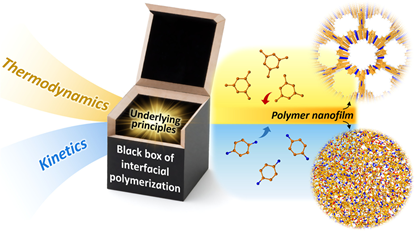Thermodynamic and kinetic understanding for managing the controllability of interfacial polymerization
Interfacial polymerization serves as a revolutionary technique to create polymer membranes such as polyamides, polyesters, and covalent organic frameworks, holding exceptional promise in numerous scenarios from liquid and gas separation to energy conversion and harvesting. Despite significant achievements, the fundamental principles of interfacial polymerization have been rarely discussed systemically, particularly from the perspective of thermodynamics, kinetics, and their combinations. This knowledge gap results in the lack of rational design and tailoring of interfacial polymerization. This review aims to revisit interfacial polymerization, integrating thermodynamics and kinetics to bridge the remained knowledge gap. We dissect the process into distinct physicochemical stages, including monomer dissolution, molecular diffusion, chemical reactions, and phase separation. Each stage is examined using thermodynamic and kinetic theories, underlining recent strides in refining process control. Furthermore, the review confronts the unresolved theoretical aspects of interfacial polymerization and the challenges inherent in mastering its controllability. We conclude by offering insights into how a controlled approach to interfacial polymerization could substantially transform the landscape of state-of-the-art polymer membranes.

.png)